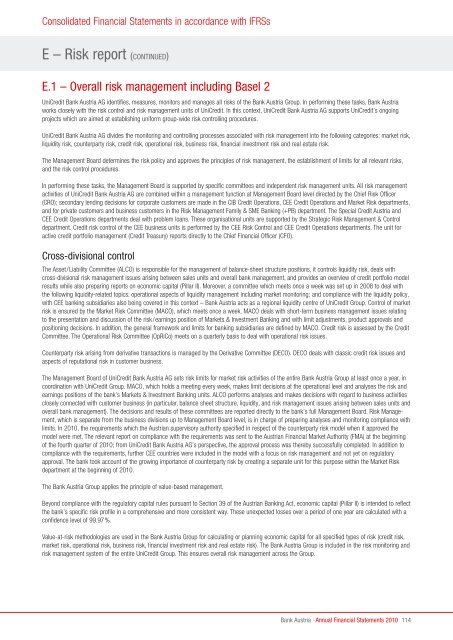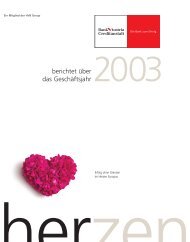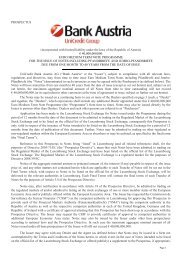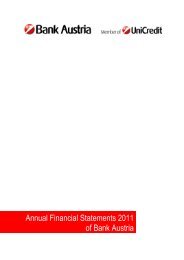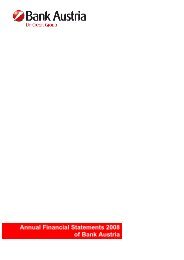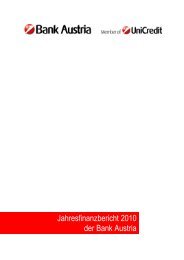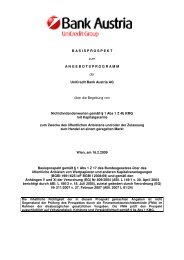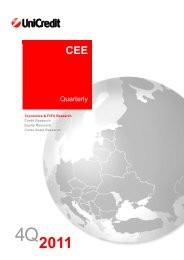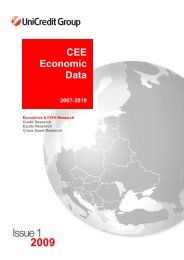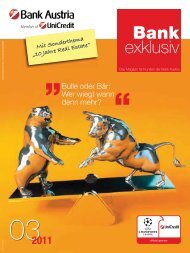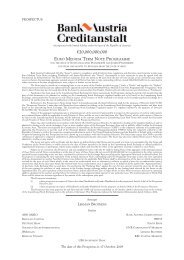Annual Financial Statements 2010 of Bank Austria
Annual Financial Statements 2010 of Bank Austria
Annual Financial Statements 2010 of Bank Austria
You also want an ePaper? Increase the reach of your titles
YUMPU automatically turns print PDFs into web optimized ePapers that Google loves.
Consolidated <strong>Financial</strong> <strong>Statements</strong> in accordance with IFRSs<br />
E – Risk report (CoNTINuED)<br />
E.1 – overall risk management including Basel 2<br />
UniCredit <strong>Bank</strong> <strong>Austria</strong> AG identifies, measures, monitors and manages all risks <strong>of</strong> the <strong>Bank</strong> <strong>Austria</strong> Group. In performing these tasks, <strong>Bank</strong> <strong>Austria</strong><br />
works closely with the risk control and risk management units <strong>of</strong> UniCredit. In this context, UniCredit <strong>Bank</strong> <strong>Austria</strong> AG supports UniCredit’s ongoing<br />
projects which are aimed at establishing uniform group-wide risk controlling procedures.<br />
UniCredit <strong>Bank</strong> <strong>Austria</strong> AG divides the monitoring and controlling processes associated with risk management into the following categories: market risk,<br />
liquidity risk, counterparty risk, credit risk, operational risk, business risk, financial investment risk and real estate risk.<br />
The Management Board determines the risk policy and approves the principles <strong>of</strong> risk management, the establishment <strong>of</strong> limits for all relevant risks,<br />
and the risk control procedures.<br />
In performing these tasks, the Management Board is supported by specific committees and independent risk management units. All risk management<br />
activities <strong>of</strong> UniCredit <strong>Bank</strong> <strong>Austria</strong> AG are combined within a management function at Management Board level directed by the Chief Risk Officer<br />
(CRO); secondary lending decisions for corporate customers are made in the CIB Credit Operations, CEE Credit Operations and Market Risk departments,<br />
and for private customers and business customers in the Risk Management Family & SME <strong>Bank</strong>ing (+PB) department. The Special Credit <strong>Austria</strong> and<br />
CEE Credit Operations departments deal with problem loans. These organisational units are supported by the Strategic Risk Management & Control<br />
department. Credit risk control <strong>of</strong> the CEE business units is performed by the CEE Risk Control and CEE Credit Operations departments. The unit for<br />
active credit portfolio management (Credit Treasury) reports directly to the Chief <strong>Financial</strong> Officer (CFO).<br />
Cross-divisional control<br />
The Asset/Liability Committee (ALCO) is responsible for the management <strong>of</strong> balance-sheet structure positions, it controls liquidity risk, deals with<br />
cross-divisional risk management issues arising between sales units and overall bank management, and provides an overview <strong>of</strong> credit portfolio model<br />
results while also preparing reports on economic capital (Pillar II). Moreover, a committee which meets once a week was set up in 2008 to deal with<br />
the following liquidity-related topics: operational aspects <strong>of</strong> liquidity management including market monitoring; and compliance with the liquidity policy,<br />
with CEE banking subsidiaries also being covered in this context – <strong>Bank</strong> <strong>Austria</strong> acts as a regional liquidity centre <strong>of</strong> UniCredit Group. Control <strong>of</strong> market<br />
risk is ensured by the Market Risk Committee (MACO), which meets once a week. MACO deals with short-term business management issues relating<br />
to the presentation and discussion <strong>of</strong> the risk/earnings position <strong>of</strong> Markets & Investment <strong>Bank</strong>ing and with limit adjustments, product approvals and<br />
positioning decisions. In addition, the general framework and limits for banking subsidiaries are defined by MACO. Credit risk is assessed by the Credit<br />
Committee. The Operational Risk Committee (OpRiCo) meets on a quarterly basis to deal with operational risk issues.<br />
Counterparty risk arising from derivative transactions is managed by the Derivative Committee (DECO). DECO deals with classic credit risk issues and<br />
aspects <strong>of</strong> reputational risk in customer business.<br />
The Management Board <strong>of</strong> UniCredit <strong>Bank</strong> <strong>Austria</strong> AG sets risk limits for market risk activities <strong>of</strong> the entire <strong>Bank</strong> <strong>Austria</strong> Group at least once a year, in<br />
coordination with UniCredit Group. MACO, which holds a meeting every week, makes limit decisions at the operational level and analyses the risk and<br />
earnings positions <strong>of</strong> the bank’s Markets & Investment <strong>Bank</strong>ing units. ALCO performs analyses and makes decisions with regard to business activities<br />
closely connected with customer business (in particular, balance sheet structure, liquidity, and risk management issues arising between sales units and<br />
overall bank management). The decisions and results <strong>of</strong> these committees are reported directly to the bank’s full Management Board. Risk Management,<br />
which is separate from the business divisions up to Management Board level, is in charge <strong>of</strong> preparing analyses and monitoring compliance with<br />
limits. In <strong>2010</strong>, the requirements which the <strong>Austria</strong>n supervisory authority specified in respect <strong>of</strong> the counterparty risk model when it approved the<br />
model were met. The relevant report on compliance with the requirements was sent to the <strong>Austria</strong>n <strong>Financial</strong> Market Authority (FMA) at the beginning<br />
<strong>of</strong> the fourth quarter <strong>of</strong> <strong>2010</strong>; from UniCredit <strong>Bank</strong> <strong>Austria</strong> AG’s perspective, the approval process was thereby successfully completed. In addition to<br />
compliance with the requirements, further CEE countries were included in the model with a focus on risk management and not yet on regulatory<br />
approval. The bank took account <strong>of</strong> the growing importance <strong>of</strong> counterparty risk by creating a separate unit for this purpose within the Market Risk<br />
department at the beginning <strong>of</strong> <strong>2010</strong>.<br />
The <strong>Bank</strong> <strong>Austria</strong> Group applies the principle <strong>of</strong> value-based management.<br />
Beyond compliance with the regulatory capital rules pursuant to Section 39 <strong>of</strong> the <strong>Austria</strong>n <strong>Bank</strong>ing Act, economic capital (Pillar II) is intended to reflect<br />
the bank’s specific risk pr<strong>of</strong>ile in a comprehensive and more consistent way. These unexpected losses over a period <strong>of</strong> one year are calculated with a<br />
confidence level <strong>of</strong> 99.97%.<br />
Value-at-risk methodologies are used in the <strong>Bank</strong> <strong>Austria</strong> Group for calculating or planning economic capital for all specified types <strong>of</strong> risk (credit risk,<br />
market risk, operational risk, business risk, financial investment risk and real estate risk). The <strong>Bank</strong> <strong>Austria</strong> Group is included in the risk monitoring and<br />
risk management system <strong>of</strong> the entire UniCredit Group. This ensures overall risk management across the Group.<br />
<strong>Bank</strong> <strong>Austria</strong> · <strong>Annual</strong> <strong>Financial</strong> <strong>Statements</strong> <strong>2010</strong><br />
114


